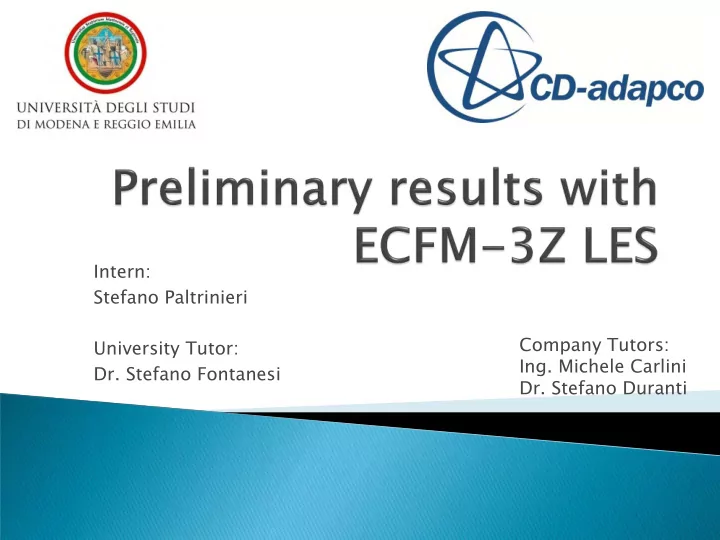

Intern: Stefano Paltrinieri Company Tutors: University Tutor: Ing. Michele Carlini Dr. Stefano Fontanesi Dr. Stefano Duranti
1° step: multi- cycle analysis of a “test” engine cylinder with LES Aims: ◦ Potentials of LES ◦ Combustion: “qualitative” comparison with literature Operating conditions: ◦ 10,000 rpm ◦ Spark Time = 675° ◦ Phi = 1 ◦ Premixed Fuel
C O N F In some problems the I upstream turbulent D kinetic energy transport E N is negligible considering T the one generated from I A local sources (such as L flows with detachments, abrupt changes in flow C section, direction, etc.) O N The use of a mean profile F of the inflow variable I can be justified. D E N T I A L
The usual trim tutorial procedure is used to create the mesh template. The template is then modified in order to meet the following targets : 1) Homogeneous mesh. 2) 0.5 mm in-cylinder cell size. 3) 1.0 mm cell size in the exhaust and intake ports.
No Events 0.4 Filter length [mm]
LES initial conditions: derived from one RANS cycle Premixed fuel C8H18 Turbulence model: LES/Smagorinsky Intake/exhaust time-varying mean pressure options: ◦ pressure option STATIC ◦ Environmental ON ◦ Mean ON Solution Algorithm PISO Under relaxation for pressure correction 0.3 MARS (blending factors) = 0.5 Residual tolerance for species and enthalpy = 1 e-12 Multi-components limiter ON for all species and enthalpy Switch 26 on ( flow remedial) Time step size during combustion = 0.009 CA° (1.3 e- 07 s)
LES front flame thickness 1° cycle
Kernel flame convected away from spark center LES – 1° cycle LES – 2° cycle
Fresh h fuel l pockets kets break k the flame me front nt and comp mplete ete their r reacti tions ons in the burnt nt zone ne.
~1.5 5 to 2 2.5 mm
1 ° LES cycle 2 ° LES cycle
4 th cycle
Green line – 4 th cycle
1 2 3 4 5
1 2 3 4 5
1 2 3 4 5
1 2 3 4 5
Domain : 7.8 million cells Cluster performance: • 6 nodes dedicated to this test • 12 cores per node • 48 Gb RAM per node • Scientific Linux • Intel 5065 processor • Parallel disks PANASAS Using michele.sh.set 10 Days per cycle
2° step: multi- cycle analysis of a “real” engine cylinder with LES Aims: ◦ Cycle-to-cycle dispersion ◦ Application of LES to industrial R&D process ◦ Combustion: “quantitative” comparison with data Operating conditions: ◦ 7,000 rpm ◦ GDI ◦ Actual Fuel
Templ mplate ate 2D “coarse”
0.6 Filter length [mm]
Average Pressure In-cylinder cycle-to-cycle dispersion at 7,000 rpm: C O N F I D E N T I A L
C O N F I D E N T I A L
Eulerian AKTIM with default constants generates a weak kernel that did not reach c=1 in reasonable time. ( “Towards the understanding of cyclic variability in a spark ignited engine using multi- cycle LES” by Vermorel et al.) Lagrangian AKTIM (RANS-model like) c = 1 never reached. Possible cause: Mesh cell size too coarse (0.45 mm) close to the spark plug.
Customized Eulerian AKTIM Ignition model needed. Flame Kernel Radius set to c=1. Need more time to validate this new procedure.
~2mm
C O N F I D E N T I A L
C O N F I D E N T I A L
1) Validate the new ignition model just defined. 2) Comparison with a finer mesh, test-case like. Already generated, it is about 5.5 million cells the whole model at the BDC. Investigation of main differences and limitations. 3) Find out differences between using time varying boundary obtained by means experimental data, coupled simulations or adding an intake plenum to the computational domain.
Investigations of low rpm where the cycle-to- cycle dispersion is higher than high rpm. Analysis of Knock/pollution connected with it. Other than cycle-by-cycle, LES can face also cylinder-to-cylinder dipersion.
Towards the understanding of cyclic variability in a spark ignited engine using multi-cycle LES. (O. Vermorel, S. Richard, O. Colin, C. Angelberger, A. Benkenida and D. Veynante) Internal Combustion Engine Fundamentals. (John B. Heywood)
E-mail il details: ils: Carlini Michele : michele. hele.ca carlini@ rlini@cd cd-ad adap apco co.com com Duranti Stefano : st stefan fano.duranti uranti@cd @cd-ad -adapco co.co com Fontanesi Stefano: stefano fano.fo fontane ntanesi@unim @unimore.it re.it Paltrinieri Stefano : stefano fano.pal altr trini nieri@ ri@cd cd-ad adap apco co.com com st stefano efanopal altrini trinier eri87@gm i87@gmai ail.co l.com
Recommend
More recommend